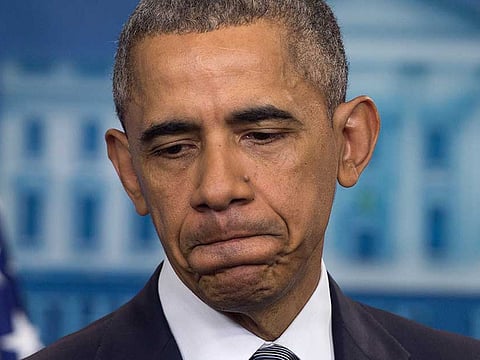US-GCC relationship: The Obama phase
If the list of criticisms heard in Washington is quite long, the list of complaints often repeated in Riyadh and other GCC capitals is even longer

There is a huge discrepancy between the reality and the negative perception of the Barack Obama phase of the United States-Gulf Cooperation Council (GCC) relationship. The glass-half-empty is the prevailing outlook and any attempt to make a case for how robust and fundamentally solid the relationship actually is fails miserably.
Washington is certainly full of criticism of Saudi Arabia these days. The list of criticisms heard in the US capital is longer than usual. Many in Washington are not happy about the GCC’s opposition to Obama’s rapprochement towards Iran. Some are also growing impatient with the one-year-old GCC military campaign in Yemen. Riyadh’s political assertiveness and the GCC states’ independent tendencies are raising alarm throughout Washington, which is used to the Gulf states as mere ducklings in need of US protection. Of course, the standard Washington criticism of GCC states’ human rights record is at an all-time high.
The list of criticisms is growing by the day and is no longer confined to the typically critical media and the public at large. These days, the criticism is also heard in the US Congress and the White House and is echoed by Obama, who is the first sitting American president to go on record as calling the GCC states “free riders”, telling them they are insufficiently attuned to the needs of their own people and accusing Saudi Arabia of spreading an extremist version of Islam throughout the Muslim world.
But if the list of criticisms heard in Washington is quite long, the list of complaints often repeated in Riyadh and the other GCC capitals is even longer. The top three complaints are the most damning. The first one has to do with the Iran-first policy pursued by Obama and his team. This pro-Iran approach implies, among other things, that Washington is probably thinking of deserting its traditional partners in the region and inching ever closer to their arch-enemy and regional rival, Tehran. The GCC states have been used to a pro-Israel policy for the past 60 years, but are yet to digest the indigestible Iran-first policy mostly associated with the Obama phase of the US-GCC relationship.
The Iran policy is not the only complaint heard nowadays in nearly all GCC capitals. The second often-heard complaint has to do with Obama’s repeated public criticism of the GCC. He has engaged in more public criticism of Riyadh than any other sitting US president. The cascade of public criticism was unusual in its ferocity and velocity. The last and probably the worst appeared in Obama’s interview with The Atlantic, where he uttered the unheard of “free riders” to describe the GCC states and other nations.
The GCC capitals consider the casual “free riders” talk disturbing and highly insulting. No wonder King Salman Bin Abdul Aziz of Saudi Arabia made sure it was the first topic in his one-on-one meeting with Obama in Riyadh. From a GCC perspective, the burst of public criticism violates a fundamental, unwritten rule that friends express their concerns, criticism and advice respectfully and in private. Obama has violated the rules of engagement in the so-called special US-GCC relationship.
Not a proud record
The third GCC complaint has to do with Obama’s claim that he knows Arabs, Muslims and the region infinitely better than his predecessors. No other sitting US president made such a claim before Obama. His pretentions that he knows the region have proven to be ill-founded. Obama is not only responsible for the current chill in US-GCC ties, but he also leaves the Middle East more dangerous and in worse shape than ever, including the killing fields in Syria — not a proud record for a US president who claims he knows the region.
Apologists of the Obama phase of the US-GCC relationship insist that not only are the fundamentals of the relationship solid, but in reality the Obama phase is full of concrete achievements and real improvements that are not recognised by the public and casual observers. The glass is half full according to some experts, not half empty as viewed via the public prism. They point out that Obama is the only sitting US president who has visited Riyadh four times. During his tenure in the White House, there have been more senior cabinet meetings between the two partners, more military and security cooperation, more American arms sales to GCC states, the diplomatic traffic is robust and investments and commercial ties are at historic highs.
So why is no one celebrating and why is the atmosphere so full of complaints, criticisms and deafening talks about tensions in the US-GCC relationship? From a GCC perspective, Obama is fully responsible for the chill and the disconnect between the reality and the widespread negative perception on both sides of the US-GCC relationship.
Dr Abdulkhaleq Abdulla is professor of Political Science, chairman of the Arab Council for Social Sciences, theacss.org and a visiting senior fellow at London School of Economics. You can follow him on Twitter at twitter.com/Abdulkhaleq_UAE.


